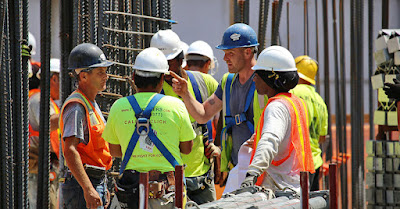Search This Blog
Most Popular
Categories
- Building Construction (87)
- Building Materials (88)
- Columns (2)
- Concrete Beam (3)
- Concrete Construction Techniques (6)
- Concrete Mix Design (15)
- Concrete Repair (14)
- Concrete Slab (11)
- Construction Equipment (17)
- Construction News (7)
- Design of Structures (20)
- Engineering Drawing (1)
- Estimation (3)
- Geotechnical engineering (26)
- Highway Engineering (11)
- Innovations (34)
- Material Testing (11)
- Matrix Analysis of Structures (2)
- Mechanical Engineering (3)
- Strength of Materials (2)
- Structural Analysis (13)
- Structural Design (24)
- Structures (17)
- Transportation Engineering (9)
10 Pro Tips for Better Communication in Construction
Team Prodyogi
November 25, 2023
Communication in construction isn't just important; it's the key to keeping everyone safe and projects running smoothly. Misunderstandings can be costly and risky. Did you know that 1 in 10 construction workers gets injured every year due to miscommunication? That's a big deal.
Let's explore 10 practical tips to make communication in construction clearer and more effective.
 |
1. Speak Plainly, Skip the Fancy Words
Construction has its own language, and not everyone speaks it. Avoid using confusing terms. Instead of saying "ponding," say "water collecting on the roof." Keep it simple, so everyone understands, saving time and preventing mistakes.2. Brush Up on Basic Communication Skills
Soft skills matter, even in construction. Consider giving your team training on clear writing, drawing, avoiding jargon, taking accurate measurements, and active listening. Online resources like Alison, Udemy, and edX can help your team improve these skills.3. Clarify Who's in Charge
Having a clear chain of command helps avoid confusion. Make sure everyone knows who is in charge, from project owners to subcontractors and individual crew members. This ensures smoother communication and accountability.Common Roles on a Construction Site
- Construction/Site Manager: Keeps the site safe and efficient
- Estimator: Estimates project cost
- Architect: Designs and oversees projects
- Supervisor: Liaison between management and field workers
- Construction Worker: Does physical labor and communicates with the team
- Engineer: Ensures team follows specific tasks
- Electrician: Installs wiring and electrical infrastructure
- Construction Foreman: Leads fieldwork, ensuring deadlines are met safely and efficiently
Common Construction Company Hierarchy
- CEO: Top executive focused on business growth
- Managing Director: Supervises day-to-day operations
- Project Director: Heads specific projects for timely, cost-effective, and safe completion
- Quality Manager: Ensures work meets company and industry standards
- Financial Team: Monitors project budgets and cash flow
- Design Team: Develops structural and aesthetic plans
- Legal Manager: Ensures project compliance with legal requirements
- Project Supervisor: Manages ground workers for safe and correct project execution
- Project Coordinator: Oversees day-to-day work execution for safety and quality
4. Use Tech Wisely for Better Communication
Construction technology is evolving, and it can improve communication. Drones for site mapping, Building Information Modeling (BIM) software for project updates, and wearable AI for real-time insights are game-changers. They may seem pricey, but they save money in the long run by improving efficiency.5. Listen Up!
Good communication isn't just about talking; it's also about listening actively. This means focusing on the speaker, asking questions, and paraphrasing to make sure you understand. It's a crucial skill that often gets overlooked.6. Check Communication Quality Regularly
Just like you check your equipment, check your communication. Ensure that everyone is documenting communication properly, from meeting notes to important details. Regular checks maintain consistency and quality.7. Keep Learning About New Processes and Equipment
Training shouldn't stop after onboarding. Ongoing training keeps everyone safe and efficient. Make sure your team stays updated on new processes and equipment. Managers should undergo the same training to stay informed.8. Encourage Open Talk
A workplace where people feel comfortable talking openly is more efficient. Studies show that open communication leads to better results and happier employees. Managers play a crucial role in establishing this environment.9. Take Your Time When Hiring
Hiring the right person is worth the time it takes. A bad hire can hurt morale and cost money. Evaluate candidates not only for technical skills but also for communication skills. Make sure they fit into your team's culture.10. Embrace a Multilingual Team
Language barriers can lead to inefficiencies and safety risks. With many foreign-born workers in construction, consider offering language training and using multiple languages for processes. This ensures everyone can do their job effectively.Conclusion
Effective communication is the backbone of successful construction projects. By following these 10 tips, you can enhance your team's communication, making the work environment safer, more efficient, and ultimately more successful.Most Visited
Soil Sampling Methods| Undisturbed and Disturbed Samples
November 08, 2023
Boring Methods for Soil Exploration
November 02, 2023
Steel Column Connected to Concrete Masonry Wall
October 11, 2017
How to Choose Good Quality Aggregates for Construction?
August 10, 2021
What are Infiltration Wells?
April 15, 2024
Terzaghi's Equation: Soil Bearing Capacity for Foundations
March 02, 2022
Structure of Timber |Macrostructure and Microstructure
March 22, 2024
Search This Blog
MUST READ
What is PERT? Objectives, Pros & Cons
September 10, 2017
Terzaghi's Equation: Soil Bearing Capacity for Foundations
March 02, 2022
Contact Form
Footer Menu Widget
Created By SoraTemplates | Distributed By Gooyaabi Templates

0 Comments
Commenting Spam Links Are Against Policies